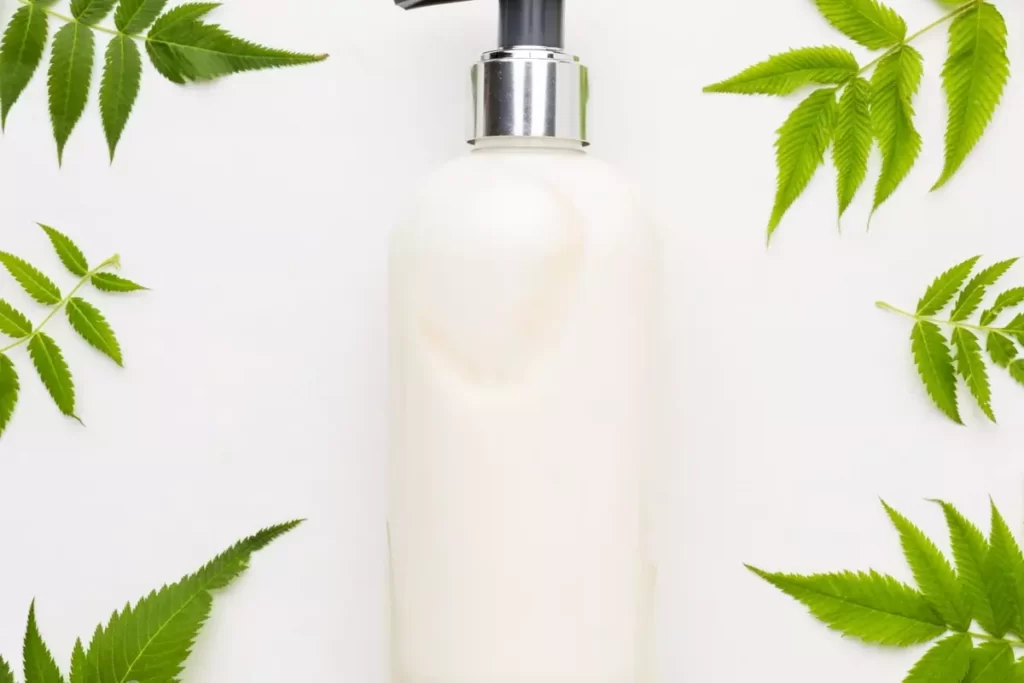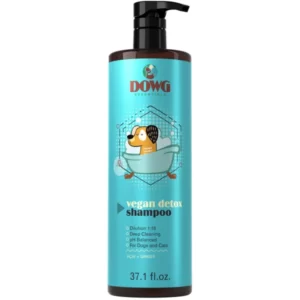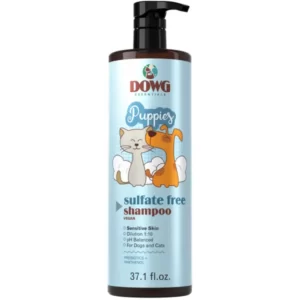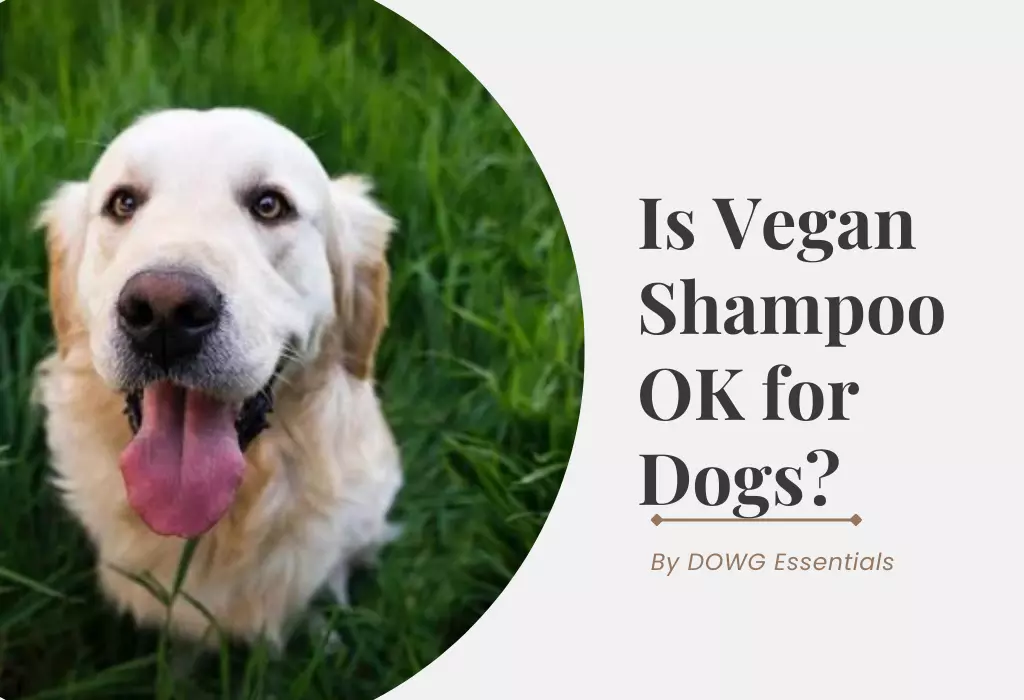Vegan Shampoo for Dogs
As a responsible pet owner, you may be curious about the safety of vegan shampoo for your furry friend. With the rise of plant-based and cruelty-free products, it’s natural to wonder whether these considerations should extend to your pet’s grooming routine. This discussion delves into the use of vegan shampoos on dogs, exploring ingredients, benefits, and potential concerns. By understanding the nuances of vegan grooming products, you can make informed decisions that prioritize your dog’s health while aligning with your ethical values. The ultimate goal is to strike a balance between conscious choices and effective canine care.

What is Vegan Shampoo?
Vegan shampoo stands as a product distinguished by its composition, deliberately excluding any components derived from animals. Traditional shampoos often feature ingredients like tallow (rendered animal fat), lanolin (a wax secreted by sheep), or beeswax, which are absent in vegan shampoo formulations. The essence of vegan shampoos lies in their commitment to providing an ethical and cruelty-free grooming option.

Why Use Vegan Shampoos?
Some pet owners choose to use vegan shampoos for their dogs for a variety of reasons, including:

- Ethical and environmental concerns: People who follow a vegan lifestyle or have ethical concerns about using animal-derived ingredients may also choose to use vegan products for their pets.
- Avoiding animal-derived ingredients: Vegan shampoos typically do not contain ingredients derived from animals, such as animal fats or proteins, which some pet owners may prefer to avoid.
- Reduced environmental impact: Vegan products often emphasize sustainability and minimizing environmental impact. Shampoos made without animal-derived ingredients can align with a desire to reduce the ecological footprint.
- Hypoallergenic properties: Vegan shampoos often avoid common allergens found in animal-derived ingredients, making them suitable for pets with allergies or sensitivities.
- Natural and plant-based ingredients: Many vegan shampoos use natural, plant-based ingredients that can be gentle on a dog’s skin and coat. These ingredients might include aloe vera, essential oils, and various plant extracts.
It’s important to note that not all vegan shampoos are safe for dogs. Always check the ingredient list to ensure the product contains safe and appropriate ingredients for your dog’s skin and coat. The well-being and health of your dog should be the top priority when choosing any grooming product, vegan or otherwise. It’s always a good idea to consult a veterinarian for advice on the best grooming products for your dog.
Is Vegan Shampoo Safe for Dogs?
Vegan shampoos are generally safe for dogs and can offer many benefits. They are often made with natural ingredients that are good for dogs’ skin and coats, and they are less likely to cause irritation or allergic reactions.

However, it is important to choose a vegan shampoo that is specifically designed for dogs. Not all vegan ingredients are safe for dogs, so it is important to read the ingredient list carefully.
When choosing a shampoo for your dog, look for one that is safe and plant-based. Avoid shampoos that contain any ingredients that could be harmful to dogs, such as essential oils.
Overall, vegan shampoos can be a good choice for dogs, but it is important to choose one that is specifically designed for them.
Factors to Consider while Selecting a Dog Shampoo
When choosing a conditioner for your pet with sensitive skin, it is important to consider the following factors:

- Ingredients: Select conditioners that are free of artificial fragrances, dyes, sulfates, and parabens, as these ingredients can trigger allergic reactions or sensitivities. Natural and organic ingredients are often gentler on the skin and can be a good choice.
- pH balance: Choose a conditioner with a pH balance that matches your pet’s natural skin pH. pH-balanced conditioners help to maintain a healthy balance of the skin and minimize irritation.
- Moisturizing properties: Select a conditioner with deep moisturizing properties to nourish and soothe sensitive skin. Look for ingredients like natural oils (coconut oil, jojoba oil) and aloe vera for effective hydration. Moisturizing conditioners help to prevent dryness and flakiness and maintain a healthier coat.
- Fragrance: Opt for fragrance-free conditioners to minimize the risk of irritation or allergic reactions. Fragrance-free options are milder and less likely to cause discomfort or adverse skin reactions.
Best Vegan Shampoos for Dogs
As a pet owner, it’s important to recognize that your furry friend’s hygiene is crucial to their health. Dogs require regular baths and brushing with the best dog shampoo to prevent skin infections and other illnesses. To minimize the risk of ailment it’s recommended to use the best dog shampoo during bath time with warm water that doesn’t exceed the body temperature

Vegan Detox Shampoo
For those who believe in vegan products for their dogs, Detox shampoo is the best choice. This is an enriched formula for a gentle cleanser that hydrates their skin during bath time. It clarifies all dirt and oils.

It is formulated with:
Acai Extract
Acai extract is a natural ingredient that can help to improve the health and appearance of pets’ coats.
Acai is a berry that is native to the Amazon rainforest. It has a deep purple color and is rich in antioxidants. Acai extract is made from the acai berry and can be used in a variety of pet products, such as shampoos, conditioners, and treats.
When used on pets’ coats, acai extract can help to:
- Nourish dull and dry coats
- Strengthen the coat from root to tip
- Add shine and luster to the coat
- Protect the coat from damage
Acai extract is also safe for pets to ingest in moderation. It can be added to their food or given to them as a treat. Acai extract is a good source of vitamins B1, B2, B3, C, and E, which are all beneficial for pets’ health.
Overall, acai extract is a natural and safe way to improve the health and appearance of pets’ coats.
Ginger extract
Ginger extract is a natural ingredient that can help to improve the health and appearance of pets’ coats. Ginger extract has soothing and cleansing properties, and it can give pets’ coats a lustrous shine. It can also stimulate hair follicles, which can lead to thicker and healthier coats. In other words, ginger extract shampoo is a natural and effective way to improve the health and appearance of pets’ coats. It can make pets’ coats softer, shinier, and thicker. It can also help pets’ coats to dry quickly, which can be a major convenience for pet owners.
Vegan Puppies & Sensitive Skin Shampoo
Vegan puppies and sensitive skin shampoo is the best dog shampoo for kittens, puppies, adult cats, and dogs. It is enriched with plant-based extracts, which help in gentle cleaning and hydrating their skin. This cat shampoo is free from sulfate, paraben, gluten, and mineral oils which may harm the pet’s skin. It is suitable for dogs and cats who are four weeks older or more. This formula contains four key ingredients that benefit pets’ skin and coats:

Panthenol
- Panthenol is a form of vitamin B5 that helps to lubricate and protect pets’ coats.
- It can help to reduce hair breakage and split ends, and it can also promote hair growth.
- Panthenol can also soothe and heal itchy skin.
Coconut Oil
- Coconut oil is a natural moisturizer that can help to hydrate pets’ skin and reduce flaking and itching.
Cupuaçu & Murumuru Amazon Butter
- Cupuaçu and murumuru Amazon butter are super moisturizers that can help lock water into the skin and restore elasticity.
Active Probiotics
- Active probiotics can help to reduce itchiness and redness in puppies and kittens, and they can also promote healthy skin.
- They can also help to restore the skin microbiome.
Overall, this cat shampoo is designed to help pets maintain healthy skin and coats. The four key ingredients work together to moisturize, protect, and soothe the skin, while also promoting hair growth
Vegan Milk Neutral silk Shampoo
Soothing irritated skin is much easier than you think if you use the right products. This neutral silk Shampoo is the best dog shampoo. It gives a calming effect to the damaged skin. Vegan Milk Neutral Silk Shampoo contains two key ingredients that benefit pets’ skin and coats:

Quinoa Amino Acid:
- Quinoa amino acid helps to strengthen the coat by replacing lost protein and reducing damage.
- It also provides elasticity and resilience to the coat.
Coconut Milk:
- Coconut milk is an active ingredient that soothes, softens, and moisturizes the coat.
- It is a highly conditioned ingredient that nourishes dry and patchy skin.
- It also gives the pet’s skin a coconut smell.
Overall, Vegan Milk Neutral Silk Shampoo is a gentle shampoo that can help to improve the health and appearance of pets’ skin and coats. It is especially beneficial for pets with dry or damaged coats.
Potential Risks of Using the Non-Vegan Shampoo on Dogs
Using a non-vegan shampoo on dogs may pose several potential risks, primarily related to the ingredients used in non-vegan shampoos. It’s important to note that while the term “non-vegan” refers to products containing ingredients derived from animals or animal by-products, not all non-vegan ingredients are necessarily harmful to dogs. However, some ingredients commonly found in non-vegan shampoos can be problematic for dogs:

Allergies and Skin Irritation:
Dogs can be sensitive to certain ingredients like fragrances, dyes, preservatives, and other chemicals commonly found in non-vegan shampoos. Allergic reactions can manifest as skin irritation, itching, redness, rashes, or hives.
Toxic Ingredients:
Some non-vegan shampoos may contain toxic substances such as parabens, sulfates, phthalates, and artificial fragrances. These ingredients can be harmful to a dog’s skin, and eyes, or if ingested during grooming.
Excessive Drying or Oil Stripping:
Non-vegan shampoos may contain harsh detergents that can strip the dog’s coat of natural oils, leading to dryness, flakiness, and an unhealthy coat. Maintaining the proper balance of oils is essential for a dog’s skin health.
Residue and Ingestion:
If not thoroughly rinsed, residues from non-vegan shampoos can remain on the dog’s coat. If the dog licks or chews its fur, it may ingest these residues, which can be harmful if the shampoo contains toxic or irritating substances.
Long-term Health Effects:
Continued use of non-vegan shampoos with harmful chemicals could potentially lead to long-term health issues, including chronic skin conditions, organ damage, or hormone disruption.
Environmental Concerns:
If the non-vegan shampoo contains environmentally harmful ingredients or is tested on animals, it raises ethical concerns related to animal welfare and environmental sustainability.
To minimize risks and ensure the well-being of your dog, it’s advisable to choose shampoos specifically formulated for dogs that are gentle, hypoallergenic, and free of harmful chemicals. If you have concerns about a particular shampoo, consulting a veterinarian before use is always a prudent step to take.
Conclusion
In conclusion, using a vegan shampoo for cats and dogs can be a safe and responsible choice for pet owners. Many vegan shampoos are specifically formulated to cater to the unique needs of our furry friends, considering their skin sensitivities and coat requirements. These shampoos often contain plant-based, gentle ingredients that contribute to a healthy skin and coat.
However, it’s of utmost importance to exercise caution and diligence by carefully examining the ingredient list before using any shampoo for cats and dogs, even if it bears the “vegan” label. Some ingredients, such as certain essential oils, might be harmful to pets. Responsible pet owners should always prioritize the safety and well-being of their beloved companions by choosing shampoos that are free from harmful substances and tailored to meet their pet’s specific needs.
Ultimately, the decision to use a vegan shampoo for cats and dogs should align with a thorough understanding of the product’s ingredients and a commitment to ensuring a safe and nurturing grooming experience for our cherished four-legged friends.




